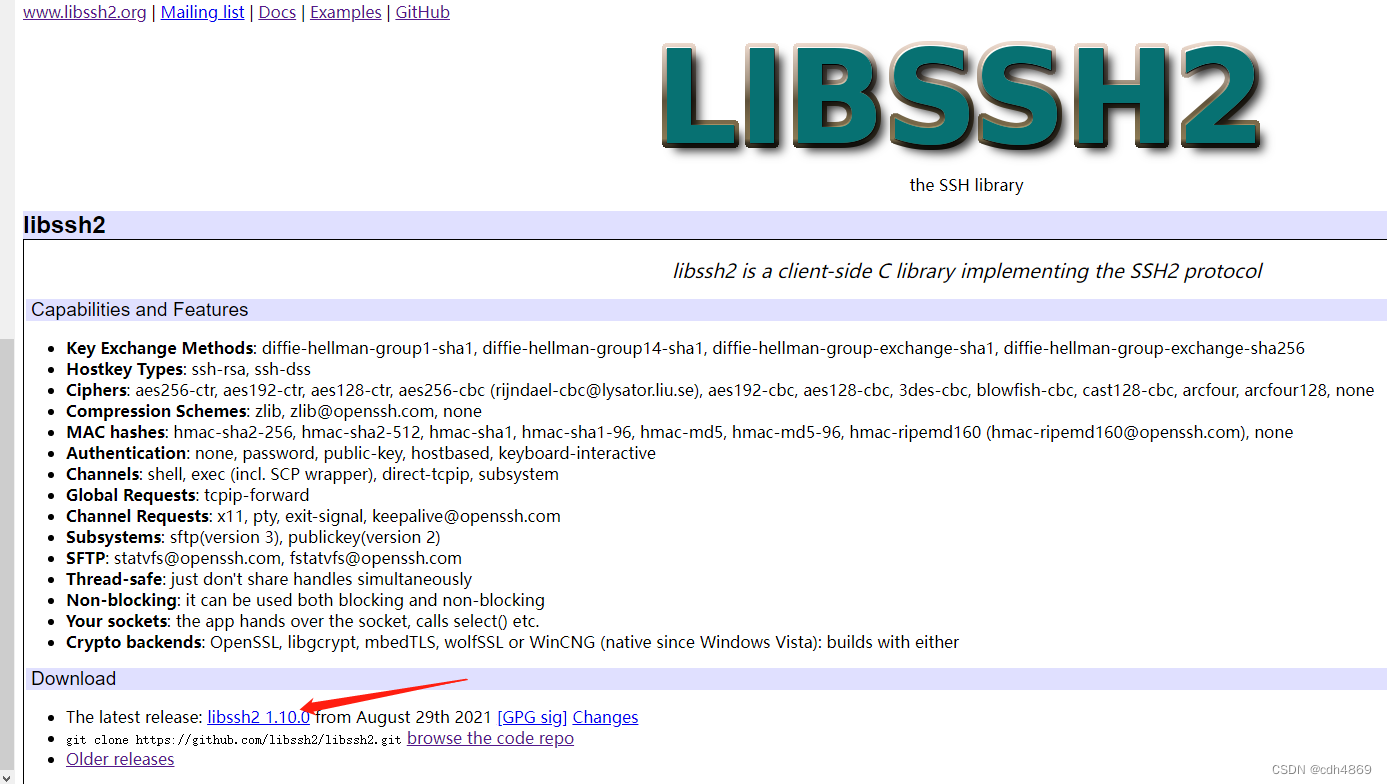目录
官方地址:https://www.libssh2.org/
正常来说,看官网说明和例子都能正常编译和使用,想偷个懒的就参考以下步骤。
1.源码下载

我当前看到的版本是libssh2-1.10.0.tar.gz
2.交叉编译
2.1 libssh2依赖openssl,我已经编译过了,就直接使用现成的;编译环境ubuntu1604;
可以参考这篇:交叉编译 OpenSSL_openssl 交叉编译_iBlackAngel的博客-CSDN博客
2.2 解压,并进入目录
tar -xzf libssh2-1.10.0.tar.gz
cd libssh2-1.10.0
2.2 编译
我测试的是hisi的,工具链是arm-himix200-linux
--prefix 配置成你自己的输出路径;
--with-libssl-prefix 配置成你编译的openssl的输出路径;
mkdir arm-himix200-linux
./configure --prefix=/home/chendh/third_part/ssh2/libssh2-1.10.0/arm-himix200-linux --host=arm-himix200-linux --with-libssl-prefix=/home/chendh/third_part/openssl/arm-himix200-linux LDFLAGS="-Wl,-rpath-link,/home/chendh/third_part/openssl/arm-himix200-linux/lib"
make && make install
3.测试代码
3.1 测试代码 testssh2.cpp;基于官方代码改了一下
/*
* Sample showing how to use libssh2 to execute a command remotely.
*
* The sample code has fixed values for host name, user name, password
* and command to run.
*
* $ ./ssh2_exec 127.0.0.1 user password "uptime"
*
*/
// #include "libssh2_setup.h"
// #include <libssh2.h>
#include <arpa/inet.h>
#include <ctype.h>
#include <errno.h>
#include <fcntl.h>
#include <libgen.h>
#include <netinet/in.h>
#include <stdio.h>
#include <stdlib.h>
#include <string.h>
#include <sys/ioctl.h>
#include <sys/types.h>
#include <termios.h>
#include <unistd.h>
#include "../arm-himix200-linux/include/libssh2.h"
#ifdef HAVE_SYS_SOCKET_H
#include <sys/socket.h>
#endif
#ifdef HAVE_UNISTD_H
#include <unistd.h>
#endif
#ifdef HAVE_NETINET_IN_H
#include <netinet/in.h>
#endif
#ifdef HAVE_ARPA_INET_H
#include <arpa/inet.h>
#endif
#include <stdio.h>
#include <stdlib.h>
#include <string.h>
static const char* hostname = "127.0.0.1";
static const char* commandline = "uptime";
static const char* pubkey = "/home/username/.ssh/id_rsa.pub";
static const char* privkey = "/home/username/.ssh/id_rsa";
static const char* username = "user";
static const char* password = "password";
static int waitsocket(libssh2_socket_t socket_fd, LIBSSH2_SESSION* session) {
struct timeval timeout;
int rc;
fd_set fd;
fd_set* writefd = NULL;
fd_set* readfd = NULL;
int dir;
timeout.tv_sec = 10;
timeout.tv_usec = 0;
FD_ZERO(&fd);
FD_SET(socket_fd, &fd);
/* now make sure we wait in the correct direction */
dir = libssh2_session_block_directions(session);
if (dir & LIBSSH2_SESSION_BLOCK_INBOUND)
readfd = &fd;
if (dir & LIBSSH2_SESSION_BLOCK_OUTBOUND)
writefd = &fd;
rc = select((int)(socket_fd + 1), readfd, writefd, NULL, &timeout);
return rc;
}
int main(int argc, char* argv[]) {
uint32_t hostaddr;
libssh2_socket_t sock;
struct sockaddr_in sin;
const char* fingerprint;
int rc;
LIBSSH2_SESSION* session = NULL;
LIBSSH2_CHANNEL* channel;
int exitcode;
char* exitsignal = (char*)"none";
ssize_t bytecount = 0;
size_t len;
LIBSSH2_KNOWNHOSTS* nh;
int type;
if (argc > 1) {
hostname = argv[1]; /* must be ip address only */
}
if (argc > 2) {
username = argv[2];
}
if (argc > 3) {
password = argv[3];
}
if (argc > 4) {
commandline = argv[4];
}
fprintf(stderr,
"=== [%d:%s] === hostname:%s username:%s password:%s "
"commandline:%s \n",
__LINE__, __func__, hostname, username, password, commandline);
rc = libssh2_init(0);
if (rc) {
fprintf(stderr, "libssh2 initialization failed (%d)\n", rc);
return 1;
}
hostaddr = inet_addr(hostname);
/* Ultra basic "connect to port 22 on localhost". Your code is
* responsible for creating the socket establishing the connection
*/
sock = socket(AF_INET, SOCK_STREAM, 0);
if (sock == LIBSSH2_INVALID_SOCKET) {
fprintf(stderr, "failed to create socket!\n");
goto shutdown;
}
sin.sin_family = AF_INET;
sin.sin_port = htons(22);
sin.sin_addr.s_addr = hostaddr;
if (connect(sock, (struct sockaddr*)(&sin), sizeof(struct sockaddr_in))) {
fprintf(stderr, "failed to connect!\n");
goto shutdown;
} else {
fprintf(stderr, "Connect success !\n");
}
/* Open a session */
session = libssh2_session_init();
if (libssh2_session_startup(session, sock) != 0) {
fprintf(stderr, "Failed Start the SSH session\n");
return -1;
}
/* Authenticate via password */
if (libssh2_userauth_password(session, username, password) != 0) {
fprintf(stderr, "Failed to authenticate\n");
close(sock);
goto shutdown;
}
/* Open a channel */
channel = libssh2_channel_open_session(session);
if (!channel) {
fprintf(stderr, "Error\n");
exit(1);
} else {
fprintf(stderr, "Open session success.\n");
}
while ((rc = libssh2_channel_exec(channel, commandline)) ==
LIBSSH2_ERROR_EAGAIN) {
waitsocket(sock, session);
}
if (rc) {
fprintf(stderr, "exec error\n");
exit(1);
} else {
fprintf(stderr, "exec finished.\n");
}
for (;;) {
ssize_t nread;
/* loop until we block */
do {
char buffer[0x4000];
nread = libssh2_channel_read(channel, buffer, sizeof(buffer));
if (nread > 0) {
ssize_t i;
bytecount += nread;
fprintf(stderr, "We read:\n");
for (i = 0; i < nread; ++i)
fputc(buffer[i], stderr);
fprintf(stderr, "\n");
} else {
if (nread != LIBSSH2_ERROR_EAGAIN)
/* no need to output this for the EAGAIN case */
fprintf(stderr, "libssh2_channel_read returned %d\n", (int)nread);
}
} while (nread > 0);
/* this is due to blocking that would occur otherwise so we loop on
this condition */
if (rc == LIBSSH2_ERROR_EAGAIN) {
waitsocket(sock, session);
} else
break;
}
exitcode = 127;
while ((rc = libssh2_channel_close(channel)) == LIBSSH2_ERROR_EAGAIN)
waitsocket(sock, session);
if (rc == 0) {
exitcode = libssh2_channel_get_exit_status(channel);
libssh2_channel_get_exit_signal(channel, &exitsignal, NULL, NULL, NULL,
NULL, NULL);
}
if (exitsignal)
fprintf(stderr, "\nGot signal: %s\n", exitsignal);
else
fprintf(stderr, "\nEXIT: %d bytecount: %d\n", exitcode, (int)bytecount);
libssh2_channel_free(channel);
channel = NULL;
shutdown:
if (session) {
libssh2_session_disconnect(session, "Normal Shutdown");
libssh2_session_free(session);
}
if (sock != LIBSSH2_INVALID_SOCKET) {
shutdown(sock, 2);
close(sock);
}
fprintf(stderr, "all done\n");
libssh2_exit();
return 0;
}3.2 编译测试代码
arm-himix200-linux-g++ testssh2.cpp -o testssh2 -L/home/chendh/third_part/ssh2/arm-himix200-linux/lib -L/home/chendh/third_part/openssl/arm-himix200-linux/lib -lssh2 -lssl -lcrypto3.3 编译出来的testssh2和libssh2的库拷贝到设备中,声明库路径环境变量和运行测试程序

3.4 常用接口
libssh2_session_init:初始化一个ssh连接
libssh2_session_set_blocking:设置session是否阻塞
libssh2_session_handshake:将socket和session握手通信
libssh2_session_disconnect:断开session的连接
libssh2_session_free:释放session
libssh2_userauth_password:检查登录用户名和密码、验证登陆
libssh2_channel_open_session:打开通道
libssh2_channel_exec:发送shell命令
libssh2_channel_read:读取命令处理结果






















 659
659











 被折叠的 条评论
为什么被折叠?
被折叠的 条评论
为什么被折叠?








